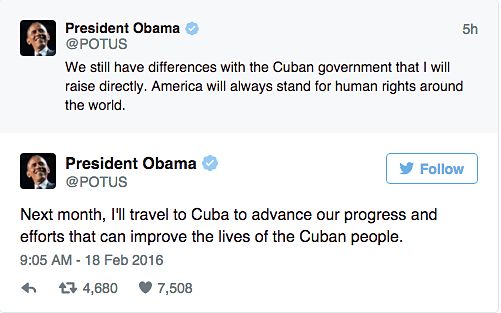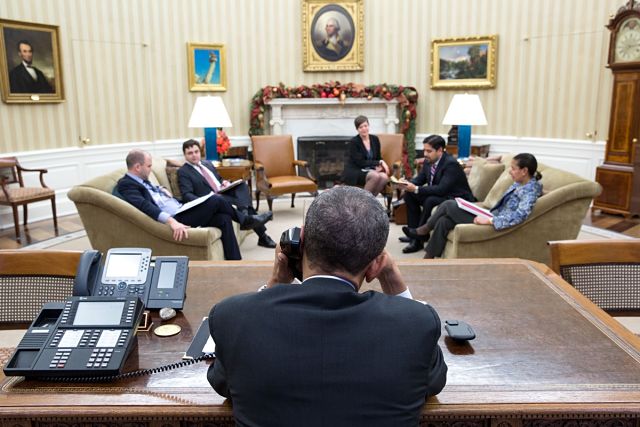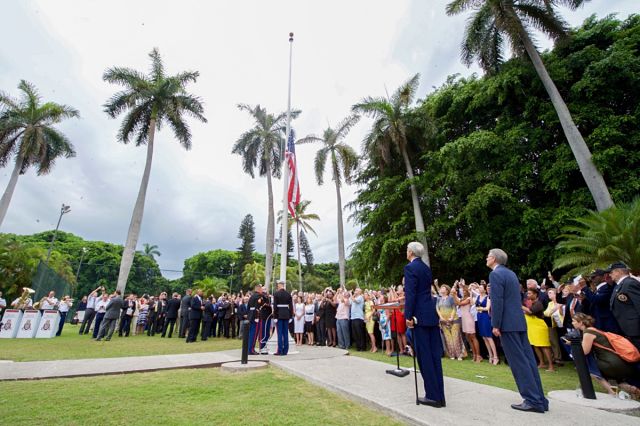VOA News
By William Gallo
Last updated on: February 18, 2016
WASHINGTON — President Barack Obama confirmed Thursday that he will visit Cuba next month to advance progress in relations between the two nations and “efforts that can improve the lives of the Cuban people.”
Writing on Twitter, Obama also vowed to raise human rights issues in talks with officials in the communist-led nation.
“This historic visit – the first by a sitting U.S. President in nearly 90 years – is another demonstration of the President’s commitment to chart a new course for U.S.-Cuban relations and connect U.S. and Cuban citizens through expanded travel, commerce, and access to information,” a White House statement said, noting that Obama will arrive for a two day visit on March 21, before traveling to Argentina.
The Cuba trip suggests Obama remains determined to push ahead with what he sees as a legacy achievement before leaving office a year from now.


President Barack Obama talks with President Raúl Castro of Cuba from the Oval Office, Dec. 16, 2014. (Official White House Photo by Pete Souza)

U.S. Secretary of State John Kerry and Chargé d’Affaires Jeffrey DeLaurentis watch as Marines raise the American flag at the Ambassador’s residence in Havana, Cuba, on August 14, 2015. [State Department photo/ Public Domain]
Since the historic thaw in ties was announced in December 2014, Obama has made steady progress breaking down diplomatic barriers with the former Cold War enemy. The successes include restoring diplomatic relations and reopening embassies in each other’s capitals. The U.S. removed Cuba from its list of state sponsors of terrorism. Obama and Cuban President Raul Castro have talked regularly and met twice.
Using his executive authority, Obama has persistently chipped away at the longstanding U.S. restrictions on business, investment and travel in Cuba.
The latest step came last week, when the two countries reached an arrangement to restore the first direct regularly scheduled commercial flights between the countries in more than 50 years.
Cuba slow to make reforms
But while Obama has continued to loosen restrictions on Cuba during the past year, progress on the Cuban end has stalled, according to John Kavulich, president of the U.S.-Cuba Trade and Economic Council.
“The Cubans haven’t really done anything, other than allowing more individuals into Cuba and making more money from them,” Kavulich told VOA.
But Havana could be motivated to make some major concessions over the next year, Kavulich says, in part to head off any future president who may want to overturn Obama’s moves.
“Everything can be reversed. And if the only activities are some airlines traveling to Cuba, that’s not going to be much of an impediment for a new president. So the Cubans now know they’re going to have make some things happen.”
Obama can also continue to loosen restrictions on his own. The biggest change Obama can enact, according to Kavulich, would be to remove the restrictions on Cuba using the dollar in international transactions, a move that could dramatically improve Cuba’s economy.
“That is the last of the big regulations that he has control of. He may be saving that for this trip,” he says.
Embargo remains in place
But there is a limit to what Obama can achieve unilaterally. The U.S. economic embargo on Cuba, which has been in place for decades, can only be removed by Congress. Although support for the embargo is declining, it still has widespread backing from lawmakers in both parties who say lifting the restrictions would essentially reward what is one of Latin America’s most politically repressive countries.
Obama argues the embargo is a broken policy that has failed to spur democratic reforms, something he says will only come when Cuba opens up to the world.
But there is little evidence detente has led to human rights improvements. Despite Cuba’s freeing some political prisoners and working to improve Internet access, censorship remains widespread and dissidents continue to be jailed at about the same rate as in past years, according to rights groups.
Nonetheless, there are hints Cuba is considering at least modest reforms to its rigid, one-party political system. Cuban President Raul Castro, brother of iconic revolutionary leader Fidel Castro, has proposed term limits for senior leaders and raised the possibility of a constitutional referendum.
More significantly, Raul, who took over from his brother in 2006, has promised to step down in 2018. If that happens, it will be the first time since 1959 that a Castro has not been in charge of the island.
Photo gallery: US Rapprochement With Cuba
Sticking points remain, but US attitudes changing
But other issues beside the Castros complicate the U.S.-Cuba relationship, including the American-run military base at Guantanamo Bay, Cuba. Raul Castro has said the only way for ties to be completely restored is if Washington returns the base to Cuban control. Obama has given no signs he intends to do that, but is working to fulfill his longtime promise of closing down the base’s controversial prison, which holds dozens of suspected terrorists.
Although challenges to the U.S.-Cuba relationship remain, there is evidence to suggest the American public does not view its southern neighbor with as much suspicion as it once did. A poll released this week by Gallup indicates 54 percent of Americans view Cuba favorably. That is up from the 10 percent of Americans who viewed Cuba positively in 1996.
But Gallup also noted the partisan divide over Cuba has grown larger. While 73 percent of Democrats view Cuba favorably, only 34 percent of Republicans do the same.
Watch: July 01, 2015 – President Obama Announces Reestablishment of US-Cuba Relations
—
Related:
President Obama is going to Cuba. Here’s why